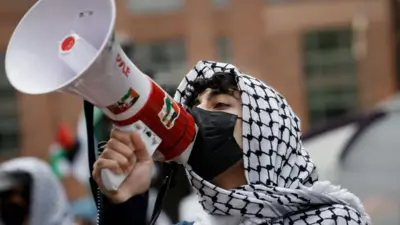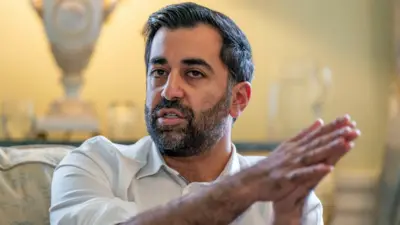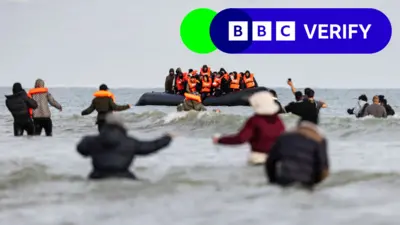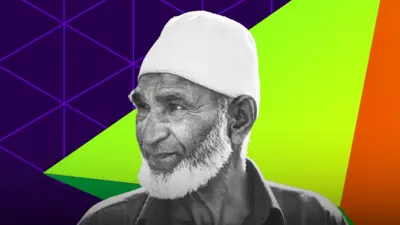We've updated our Privacy and Cookies Policy
We've made some important changes to our Privacy and Cookies Policy and we want you to know what this means for you and your data.
Iran warns Israel against 'reckless' retaliation
- By Doug Faulkner
- BBC News
Iran has warned Israel that any "reckless" retaliation to its unprecedented aerial attack would receive a "much stronger response".
More than 300 drones and missiles were launched at Israel by Iran overnight, following the 1 April Israeli strike on Iran's consulate in Syria.
Israel said it and allies had intercepted 99% of the weapons.
It marked Iran's first direct attack on Israel, with the two countries having waged a years-long shadow war.
World leaders have urged restraint amid concerns about a major escalation in tensions in the Middle East.
Following the attack, Israel's Prime Minister Benjamin Netanyahu vowed "together we will win", but it is unclear how his country plans to respond.
Last week, Israel's defence and foreign ministers warned that if Iran attacked Israel, Israel would strike back inside Iran.
- LIVE UPDATES: Follow the latest on the Iran-Israel attack
- EXPLAINED: Everything we know so far about wave of Iranian attacks
- LEARN: What is Israel's Iron Dome missile system?
- UPDATE ME: Israel on high alert after unprecedented Iranian attack
- WATCH: Explosions in sky over Jerusalem
- WATCH: Iran drone attack 'major escalation' - Israeli military
An attack had been anticipated after the strike on the Damascus consulate killed seven Islamic Revolutionary Guard Corps (IRGC) officers.
In a statement reported by AFP, Iran's President Ebrahim Raisi said "if the Zionist regime [Israel] or its supporters demonstrate reckless behaviour, they will receive a decisive and much stronger response".
Iran's IRGC - the most powerful branch of its armed forces - said it had launched the attack "in retaliation against the Zionist regime's [Israel] repeated crimes, including the attack on the Iranian embassy's consulate in Damascus".
Following the strikes the Iranian mission to the UN said "the matter can be deemed concluded".
Iranian armed forces chief of staff Maj Gen Mohammad Bagheri told state TV the US had been warned - via Switzerland - that American backing of an Israeli retaliation would result in US regional bases being targeted.
Iranian Foreign Minister Hossein Amir-Abdollahian said he had told the US attacks against Israel will be "limited" and for self-defence, Reuters news agency reported.
US President Joe Biden spoke to Mr Netanyahu following the launch of the Iranian attack and reaffirmed "America's ironclad commitment to the security of Israel".
He condemned the "unprecedented" attack on Israel and said the US had helped Israel and other allies to "take down nearly all" of the missiles and drones.
Sirens sounded across Israel and loud explosions were heard over Jerusalem, with air defence systems shooting down objects over the city.
The New York Times, citing Israeli intelligence sources, reported that the main targets appeared to be military instillations in the occupied Golan Heights.
An Israeli military spokesman said around 360 munitions had been fired - including 170 explosive drones, 30 cruise missiles and 120 ballistic missiles - but Israel has said very little damage had been done.
Israel Defense Forces (IDF) spokesman Rear Adm Daniel Hagari said some Iranian missiles had hit inside Israel, causing minor damage to a military base but no casualties.
He said a 10-year-old Bedouin girl had been severely injured by shrapnel from falling debris in the southern Arad region.
World leaders will be considering their response to the major escalation in tensions between Israel and Iran, with many condemning the attack or warning of the dangers of escalation.
Mr Biden said he would convene "my fellow G7 leaders to co-ordinate a united diplomatic response to Iran's brazen attack".
The UN Security Council will also hold an emergency meeting later, its president Vanessa Frazier said.
UN Secretary General António Guterres issued a statement saying he "strongly condemn[ed] the serious escalation represented by the large-scale attack launched on Israel" by Iran.
He called for "an immediate cessation of these hostilities" and for all sides to exercise maximum restraint.
UK Prime Minister Rishi Sunak called the strikes "reckless", while the European Union's foreign affairs chief Josep Borrell said it was a "grave threat to regional security".
China's foreign ministry urged restraint, characterising it as "the latest spillover of the Gaza conflict", while Russia's foreign ministry expressed "extreme concern over another dangerous escalation".
On Sunday, France recommended its citizens in Iran should temporarily leave the country due to the risk of military escalation.
Speaking to crowds at the Vatican on Sunday, Pope Francis made a "heartfelt appeal for a halt to any action that could fuel a spiral of violence with the risk of dragging the Middle East into an even greater conflict".
There have been increased tensions in the Middle East since the 7 October Hamas attacks on Israel, in which about 1,200 people, mostly civilians, were killed and more than 250 others were taken hostage.
The subsequent Israeli military operation in Gaza has killed 33,729 people, mostly civilians, according to the Hamas-run health ministry.
Meanwhile Israel's spy agency Mossad said Hamas negotiators had rejected the most recent proposal put forward by mediators in peace talks.
In a statement it said this proved Hamas' Gaza leader Yahya Sinwar "does not want a humanitarian deal and the return of the hostages" and was "continuing to exploit the tension with Iran".
On Saturday, Hamas said it stood by its demand for a permanent ceasefire in the Gaza war, a complete Israeli withdrawal from the Gaza Strip, a return of Palestinians displaced by the fighting to their homes, and increased humanitarian aid to the territory.
Top Stories
Features & Analysis
Most read
Content is not available








